Analysis of Evidence-Based Preventative Policing for Level 3 Diploma
VerifiedAdded on 2020/05/04
|16
|3758
|39
Report
AI Summary
This report provides a detailed analysis of evidence-based preventative policing, exploring the legislation, organizational requirements, and principles that support this approach. It examines key concepts such as targeting, testing, and tracking, and discusses various sources of evidence that inform good practices in preventative policing. The report also delves into the relationship between decision-making processes and evidence-based approaches, highlighting the National Decision Model. Furthermore, it outlines the benefits of this approach in reducing crime, evaluates different policing situations where it can be effective, and emphasizes the importance of collaborative action between stakeholders. The report also covers the impact of legislation like the Data Protection Act, Freedom of Information Act, Criminal Procedure and Investigations Act, and Regulation of Investigatory Powers Act. The report highlights the importance of ethics, community engagement, and collaborative action for the success of evidence-based preventative policing.

Running head: LEVEL 3 DIPLOMA IN POLICING
Level 3 diploma in policing
Name of the student:
Name of the university:
Author note:
Level 3 diploma in policing
Name of the student:
Name of the university:
Author note:
Paraphrase This Document
Need a fresh take? Get an instant paraphrase of this document with our AI Paraphraser

1
LEVEL 3 DIPLOMA IN POLICING
Table of contents
1.1 Summarizing the legislation, organizational and other requirements that support evidence-
based preventative policing approach..............................................................................................2
1.2 Principles of evidence-based preventative policing approach...................................................3
Targeting......................................................................................................................................3
Testing.........................................................................................................................................4
Tracking.......................................................................................................................................4
1.3 Sources and evidences, which can inform good practice in preventative policing...................5
1.4 Relation between decision-making processes and evidence based preventative policing
approach...........................................................................................................................................6
1.5 Benefits of evidence based preventive policing approach to reduce crime...............................7
1.6 Evaluation of the different policing situations, in which evidence based preventive policing
approach, can be effective...............................................................................................................9
Crime and investigation...............................................................................................................9
Ethics and values.........................................................................................................................9
Community engagement............................................................................................................10
1.7 Importance of collaborative action between stakeholders to achieve evidence based
preventive policing approach.........................................................................................................10
Bibliography..................................................................................................................................12
LEVEL 3 DIPLOMA IN POLICING
Table of contents
1.1 Summarizing the legislation, organizational and other requirements that support evidence-
based preventative policing approach..............................................................................................2
1.2 Principles of evidence-based preventative policing approach...................................................3
Targeting......................................................................................................................................3
Testing.........................................................................................................................................4
Tracking.......................................................................................................................................4
1.3 Sources and evidences, which can inform good practice in preventative policing...................5
1.4 Relation between decision-making processes and evidence based preventative policing
approach...........................................................................................................................................6
1.5 Benefits of evidence based preventive policing approach to reduce crime...............................7
1.6 Evaluation of the different policing situations, in which evidence based preventive policing
approach, can be effective...............................................................................................................9
Crime and investigation...............................................................................................................9
Ethics and values.........................................................................................................................9
Community engagement............................................................................................................10
1.7 Importance of collaborative action between stakeholders to achieve evidence based
preventive policing approach.........................................................................................................10
Bibliography..................................................................................................................................12

2
LEVEL 3 DIPLOMA IN POLICING
LEVEL 3 DIPLOMA IN POLICING
⊘ This is a preview!⊘
Do you want full access?
Subscribe today to unlock all pages.

Trusted by 1+ million students worldwide
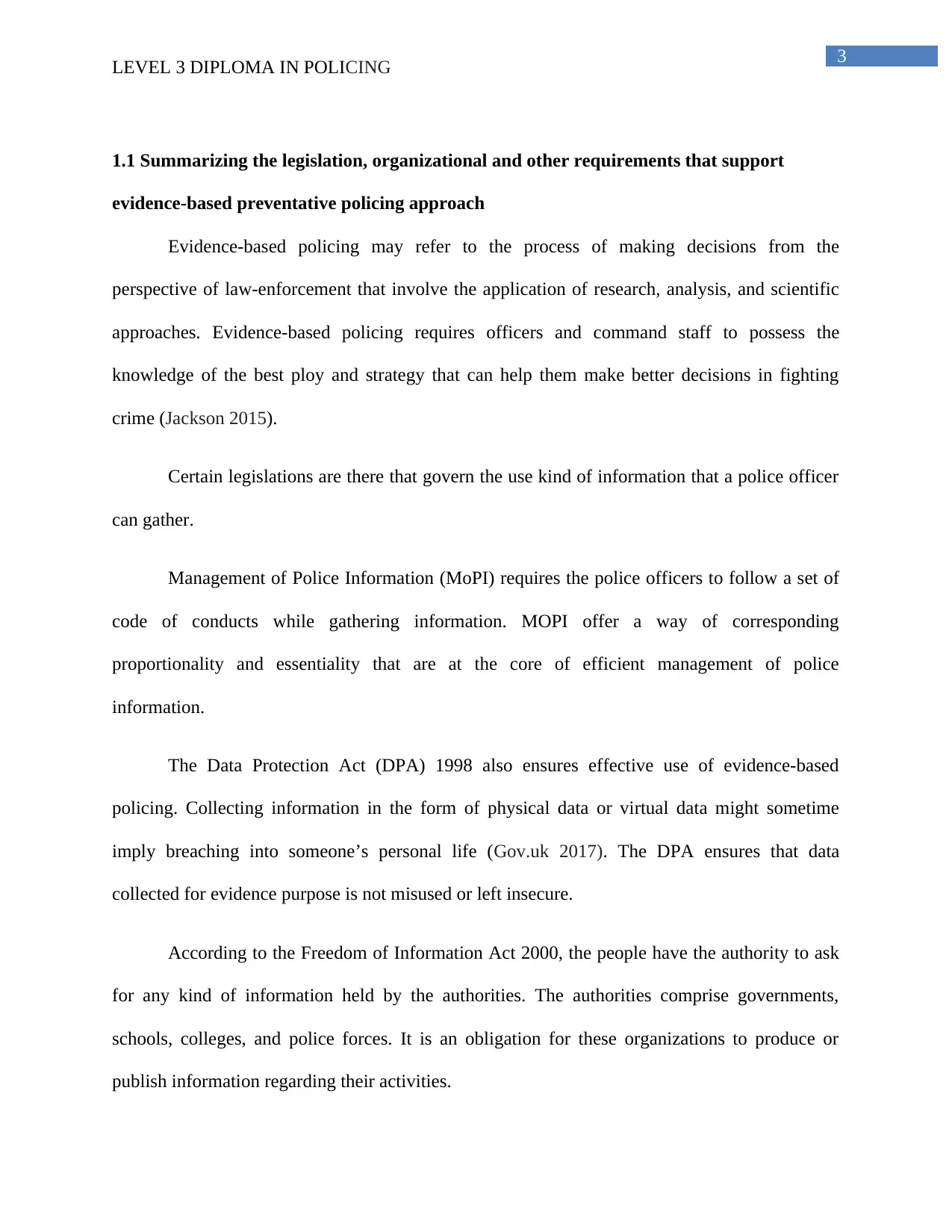
3
LEVEL 3 DIPLOMA IN POLICING
1.1 Summarizing the legislation, organizational and other requirements that support
evidence-based preventative policing approach
Evidence-based policing may refer to the process of making decisions from the
perspective of law-enforcement that involve the application of research, analysis, and scientific
approaches. Evidence-based policing requires officers and command staff to possess the
knowledge of the best ploy and strategy that can help them make better decisions in fighting
crime (Jackson 2015).
Certain legislations are there that govern the use kind of information that a police officer
can gather.
Management of Police Information (MoPI) requires the police officers to follow a set of
code of conducts while gathering information. MOPI offer a way of corresponding
proportionality and essentiality that are at the core of efficient management of police
information.
The Data Protection Act (DPA) 1998 also ensures effective use of evidence-based
policing. Collecting information in the form of physical data or virtual data might sometime
imply breaching into someone’s personal life (Gov.uk 2017). The DPA ensures that data
collected for evidence purpose is not misused or left insecure.
According to the Freedom of Information Act 2000, the people have the authority to ask
for any kind of information held by the authorities. The authorities comprise governments,
schools, colleges, and police forces. It is an obligation for these organizations to produce or
publish information regarding their activities.
LEVEL 3 DIPLOMA IN POLICING
1.1 Summarizing the legislation, organizational and other requirements that support
evidence-based preventative policing approach
Evidence-based policing may refer to the process of making decisions from the
perspective of law-enforcement that involve the application of research, analysis, and scientific
approaches. Evidence-based policing requires officers and command staff to possess the
knowledge of the best ploy and strategy that can help them make better decisions in fighting
crime (Jackson 2015).
Certain legislations are there that govern the use kind of information that a police officer
can gather.
Management of Police Information (MoPI) requires the police officers to follow a set of
code of conducts while gathering information. MOPI offer a way of corresponding
proportionality and essentiality that are at the core of efficient management of police
information.
The Data Protection Act (DPA) 1998 also ensures effective use of evidence-based
policing. Collecting information in the form of physical data or virtual data might sometime
imply breaching into someone’s personal life (Gov.uk 2017). The DPA ensures that data
collected for evidence purpose is not misused or left insecure.
According to the Freedom of Information Act 2000, the people have the authority to ask
for any kind of information held by the authorities. The authorities comprise governments,
schools, colleges, and police forces. It is an obligation for these organizations to produce or
publish information regarding their activities.
Paraphrase This Document
Need a fresh take? Get an instant paraphrase of this document with our AI Paraphraser
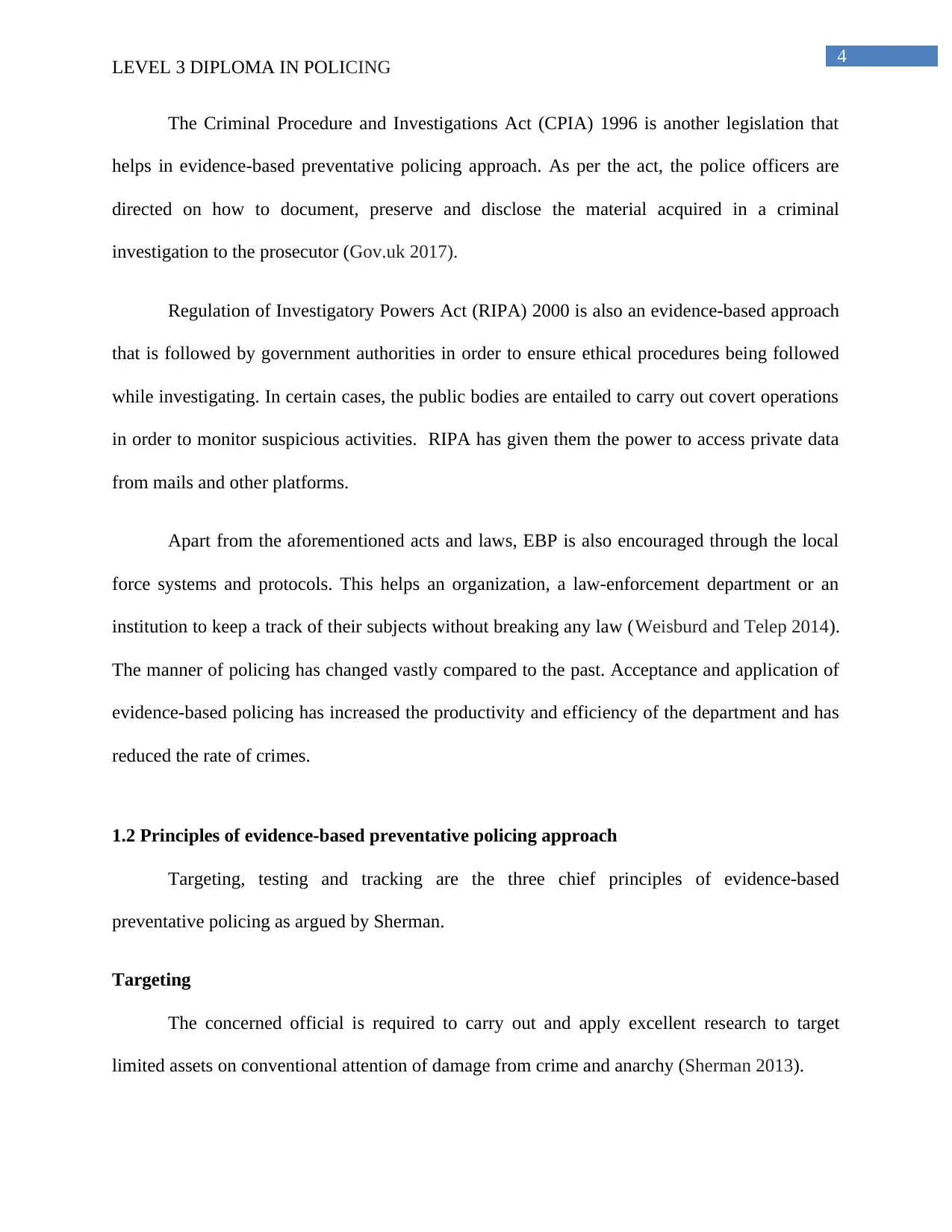
4
LEVEL 3 DIPLOMA IN POLICING
The Criminal Procedure and Investigations Act (CPIA) 1996 is another legislation that
helps in evidence-based preventative policing approach. As per the act, the police officers are
directed on how to document, preserve and disclose the material acquired in a criminal
investigation to the prosecutor (Gov.uk 2017).
Regulation of Investigatory Powers Act (RIPA) 2000 is also an evidence-based approach
that is followed by government authorities in order to ensure ethical procedures being followed
while investigating. In certain cases, the public bodies are entailed to carry out covert operations
in order to monitor suspicious activities. RIPA has given them the power to access private data
from mails and other platforms.
Apart from the aforementioned acts and laws, EBP is also encouraged through the local
force systems and protocols. This helps an organization, a law-enforcement department or an
institution to keep a track of their subjects without breaking any law (Weisburd and Telep 2014).
The manner of policing has changed vastly compared to the past. Acceptance and application of
evidence-based policing has increased the productivity and efficiency of the department and has
reduced the rate of crimes.
1.2 Principles of evidence-based preventative policing approach
Targeting, testing and tracking are the three chief principles of evidence-based
preventative policing as argued by Sherman.
Targeting
The concerned official is required to carry out and apply excellent research to target
limited assets on conventional attention of damage from crime and anarchy (Sherman 2013).
LEVEL 3 DIPLOMA IN POLICING
The Criminal Procedure and Investigations Act (CPIA) 1996 is another legislation that
helps in evidence-based preventative policing approach. As per the act, the police officers are
directed on how to document, preserve and disclose the material acquired in a criminal
investigation to the prosecutor (Gov.uk 2017).
Regulation of Investigatory Powers Act (RIPA) 2000 is also an evidence-based approach
that is followed by government authorities in order to ensure ethical procedures being followed
while investigating. In certain cases, the public bodies are entailed to carry out covert operations
in order to monitor suspicious activities. RIPA has given them the power to access private data
from mails and other platforms.
Apart from the aforementioned acts and laws, EBP is also encouraged through the local
force systems and protocols. This helps an organization, a law-enforcement department or an
institution to keep a track of their subjects without breaking any law (Weisburd and Telep 2014).
The manner of policing has changed vastly compared to the past. Acceptance and application of
evidence-based policing has increased the productivity and efficiency of the department and has
reduced the rate of crimes.
1.2 Principles of evidence-based preventative policing approach
Targeting, testing and tracking are the three chief principles of evidence-based
preventative policing as argued by Sherman.
Targeting
The concerned official is required to carry out and apply excellent research to target
limited assets on conventional attention of damage from crime and anarchy (Sherman 2013).
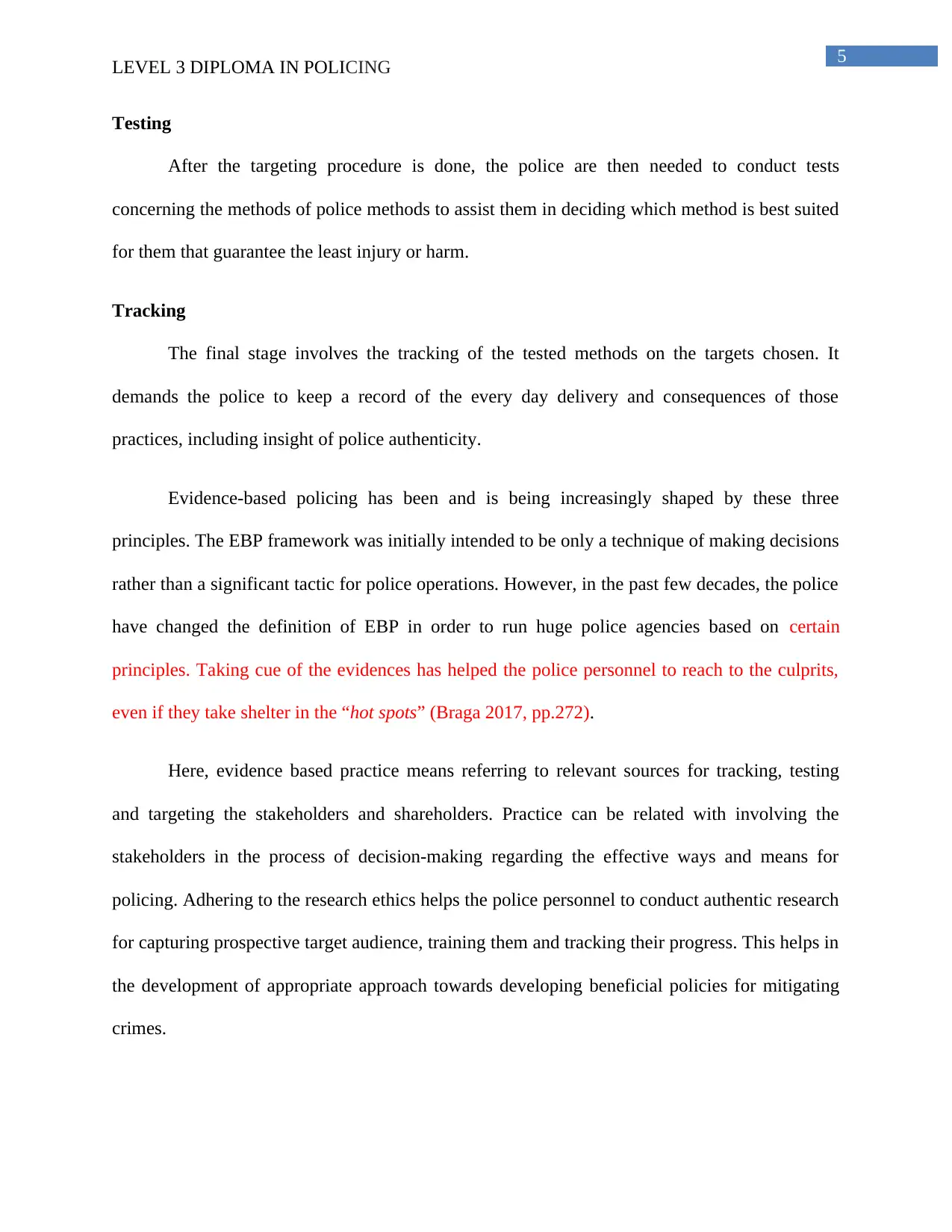
5
LEVEL 3 DIPLOMA IN POLICING
Testing
After the targeting procedure is done, the police are then needed to conduct tests
concerning the methods of police methods to assist them in deciding which method is best suited
for them that guarantee the least injury or harm.
Tracking
The final stage involves the tracking of the tested methods on the targets chosen. It
demands the police to keep a record of the every day delivery and consequences of those
practices, including insight of police authenticity.
Evidence-based policing has been and is being increasingly shaped by these three
principles. The EBP framework was initially intended to be only a technique of making decisions
rather than a significant tactic for police operations. However, in the past few decades, the police
have changed the definition of EBP in order to run huge police agencies based on certain
principles. Taking cue of the evidences has helped the police personnel to reach to the culprits,
even if they take shelter in the “hot spots” (Braga 2017, pp.272).
Here, evidence based practice means referring to relevant sources for tracking, testing
and targeting the stakeholders and shareholders. Practice can be related with involving the
stakeholders in the process of decision-making regarding the effective ways and means for
policing. Adhering to the research ethics helps the police personnel to conduct authentic research
for capturing prospective target audience, training them and tracking their progress. This helps in
the development of appropriate approach towards developing beneficial policies for mitigating
crimes.
LEVEL 3 DIPLOMA IN POLICING
Testing
After the targeting procedure is done, the police are then needed to conduct tests
concerning the methods of police methods to assist them in deciding which method is best suited
for them that guarantee the least injury or harm.
Tracking
The final stage involves the tracking of the tested methods on the targets chosen. It
demands the police to keep a record of the every day delivery and consequences of those
practices, including insight of police authenticity.
Evidence-based policing has been and is being increasingly shaped by these three
principles. The EBP framework was initially intended to be only a technique of making decisions
rather than a significant tactic for police operations. However, in the past few decades, the police
have changed the definition of EBP in order to run huge police agencies based on certain
principles. Taking cue of the evidences has helped the police personnel to reach to the culprits,
even if they take shelter in the “hot spots” (Braga 2017, pp.272).
Here, evidence based practice means referring to relevant sources for tracking, testing
and targeting the stakeholders and shareholders. Practice can be related with involving the
stakeholders in the process of decision-making regarding the effective ways and means for
policing. Adhering to the research ethics helps the police personnel to conduct authentic research
for capturing prospective target audience, training them and tracking their progress. This helps in
the development of appropriate approach towards developing beneficial policies for mitigating
crimes.
⊘ This is a preview!⊘
Do you want full access?
Subscribe today to unlock all pages.

Trusted by 1+ million students worldwide
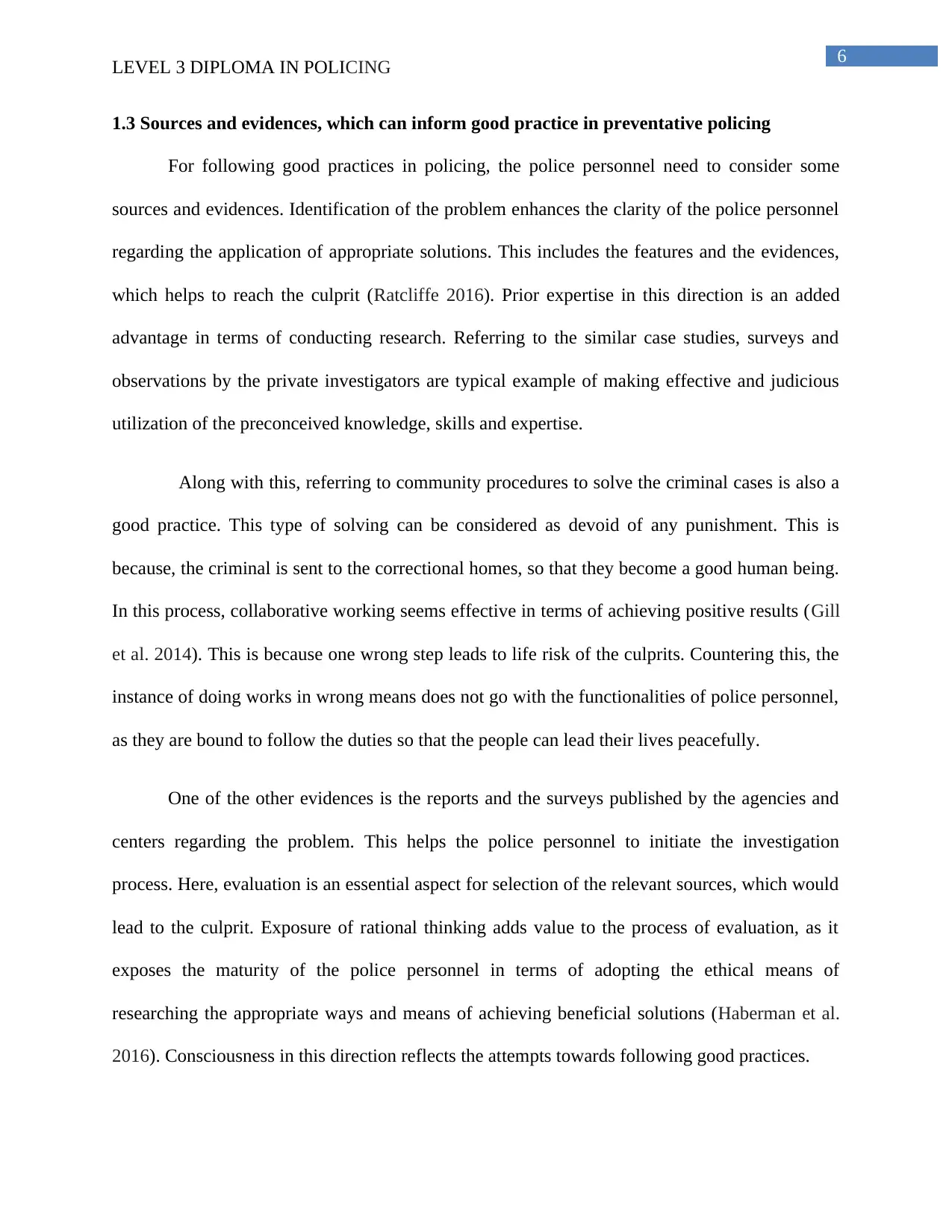
6
LEVEL 3 DIPLOMA IN POLICING
1.3 Sources and evidences, which can inform good practice in preventative policing
For following good practices in policing, the police personnel need to consider some
sources and evidences. Identification of the problem enhances the clarity of the police personnel
regarding the application of appropriate solutions. This includes the features and the evidences,
which helps to reach the culprit (Ratcliffe 2016). Prior expertise in this direction is an added
advantage in terms of conducting research. Referring to the similar case studies, surveys and
observations by the private investigators are typical example of making effective and judicious
utilization of the preconceived knowledge, skills and expertise.
Along with this, referring to community procedures to solve the criminal cases is also a
good practice. This type of solving can be considered as devoid of any punishment. This is
because, the criminal is sent to the correctional homes, so that they become a good human being.
In this process, collaborative working seems effective in terms of achieving positive results (Gill
et al. 2014). This is because one wrong step leads to life risk of the culprits. Countering this, the
instance of doing works in wrong means does not go with the functionalities of police personnel,
as they are bound to follow the duties so that the people can lead their lives peacefully.
One of the other evidences is the reports and the surveys published by the agencies and
centers regarding the problem. This helps the police personnel to initiate the investigation
process. Here, evaluation is an essential aspect for selection of the relevant sources, which would
lead to the culprit. Exposure of rational thinking adds value to the process of evaluation, as it
exposes the maturity of the police personnel in terms of adopting the ethical means of
researching the appropriate ways and means of achieving beneficial solutions (Haberman et al.
2016). Consciousness in this direction reflects the attempts towards following good practices.
LEVEL 3 DIPLOMA IN POLICING
1.3 Sources and evidences, which can inform good practice in preventative policing
For following good practices in policing, the police personnel need to consider some
sources and evidences. Identification of the problem enhances the clarity of the police personnel
regarding the application of appropriate solutions. This includes the features and the evidences,
which helps to reach the culprit (Ratcliffe 2016). Prior expertise in this direction is an added
advantage in terms of conducting research. Referring to the similar case studies, surveys and
observations by the private investigators are typical example of making effective and judicious
utilization of the preconceived knowledge, skills and expertise.
Along with this, referring to community procedures to solve the criminal cases is also a
good practice. This type of solving can be considered as devoid of any punishment. This is
because, the criminal is sent to the correctional homes, so that they become a good human being.
In this process, collaborative working seems effective in terms of achieving positive results (Gill
et al. 2014). This is because one wrong step leads to life risk of the culprits. Countering this, the
instance of doing works in wrong means does not go with the functionalities of police personnel,
as they are bound to follow the duties so that the people can lead their lives peacefully.
One of the other evidences is the reports and the surveys published by the agencies and
centers regarding the problem. This helps the police personnel to initiate the investigation
process. Here, evaluation is an essential aspect for selection of the relevant sources, which would
lead to the culprit. Exposure of rational thinking adds value to the process of evaluation, as it
exposes the maturity of the police personnel in terms of adopting the ethical means of
researching the appropriate ways and means of achieving beneficial solutions (Haberman et al.
2016). Consciousness in this direction reflects the attempts towards following good practices.
Paraphrase This Document
Need a fresh take? Get an instant paraphrase of this document with our AI Paraphraser
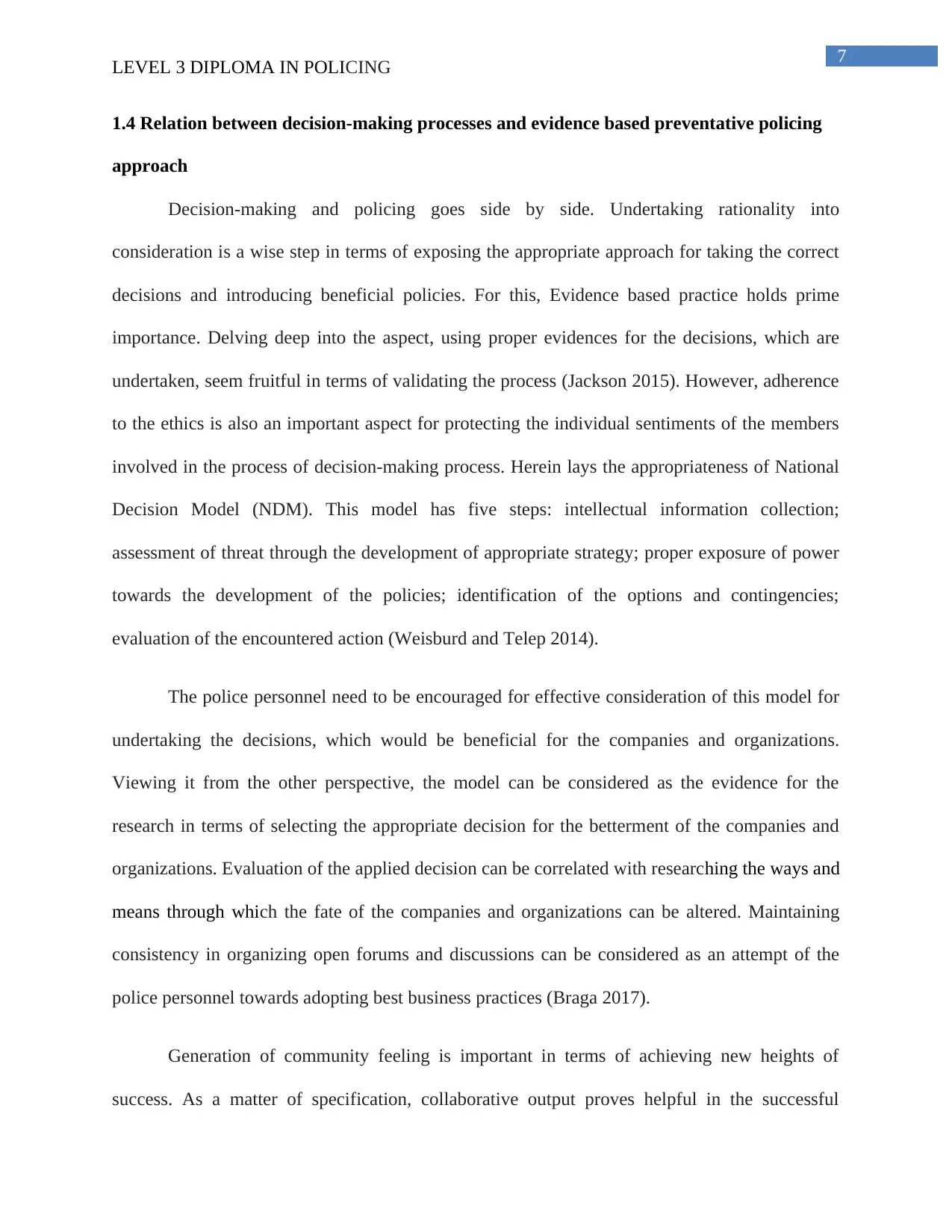
7
LEVEL 3 DIPLOMA IN POLICING
1.4 Relation between decision-making processes and evidence based preventative policing
approach
Decision-making and policing goes side by side. Undertaking rationality into
consideration is a wise step in terms of exposing the appropriate approach for taking the correct
decisions and introducing beneficial policies. For this, Evidence based practice holds prime
importance. Delving deep into the aspect, using proper evidences for the decisions, which are
undertaken, seem fruitful in terms of validating the process (Jackson 2015). However, adherence
to the ethics is also an important aspect for protecting the individual sentiments of the members
involved in the process of decision-making process. Herein lays the appropriateness of National
Decision Model (NDM). This model has five steps: intellectual information collection;
assessment of threat through the development of appropriate strategy; proper exposure of power
towards the development of the policies; identification of the options and contingencies;
evaluation of the encountered action (Weisburd and Telep 2014).
The police personnel need to be encouraged for effective consideration of this model for
undertaking the decisions, which would be beneficial for the companies and organizations.
Viewing it from the other perspective, the model can be considered as the evidence for the
research in terms of selecting the appropriate decision for the betterment of the companies and
organizations. Evaluation of the applied decision can be correlated with researching the ways and
means through which the fate of the companies and organizations can be altered. Maintaining
consistency in organizing open forums and discussions can be considered as an attempt of the
police personnel towards adopting best business practices (Braga 2017).
Generation of community feeling is important in terms of achieving new heights of
success. As a matter of specification, collaborative output proves helpful in the successful
LEVEL 3 DIPLOMA IN POLICING
1.4 Relation between decision-making processes and evidence based preventative policing
approach
Decision-making and policing goes side by side. Undertaking rationality into
consideration is a wise step in terms of exposing the appropriate approach for taking the correct
decisions and introducing beneficial policies. For this, Evidence based practice holds prime
importance. Delving deep into the aspect, using proper evidences for the decisions, which are
undertaken, seem fruitful in terms of validating the process (Jackson 2015). However, adherence
to the ethics is also an important aspect for protecting the individual sentiments of the members
involved in the process of decision-making process. Herein lays the appropriateness of National
Decision Model (NDM). This model has five steps: intellectual information collection;
assessment of threat through the development of appropriate strategy; proper exposure of power
towards the development of the policies; identification of the options and contingencies;
evaluation of the encountered action (Weisburd and Telep 2014).
The police personnel need to be encouraged for effective consideration of this model for
undertaking the decisions, which would be beneficial for the companies and organizations.
Viewing it from the other perspective, the model can be considered as the evidence for the
research in terms of selecting the appropriate decision for the betterment of the companies and
organizations. Evaluation of the applied decision can be correlated with researching the ways and
means through which the fate of the companies and organizations can be altered. Maintaining
consistency in organizing open forums and discussions can be considered as an attempt of the
police personnel towards adopting best business practices (Braga 2017).
Generation of community feeling is important in terms of achieving new heights of
success. As a matter of specification, collaborative output proves helpful in the successful
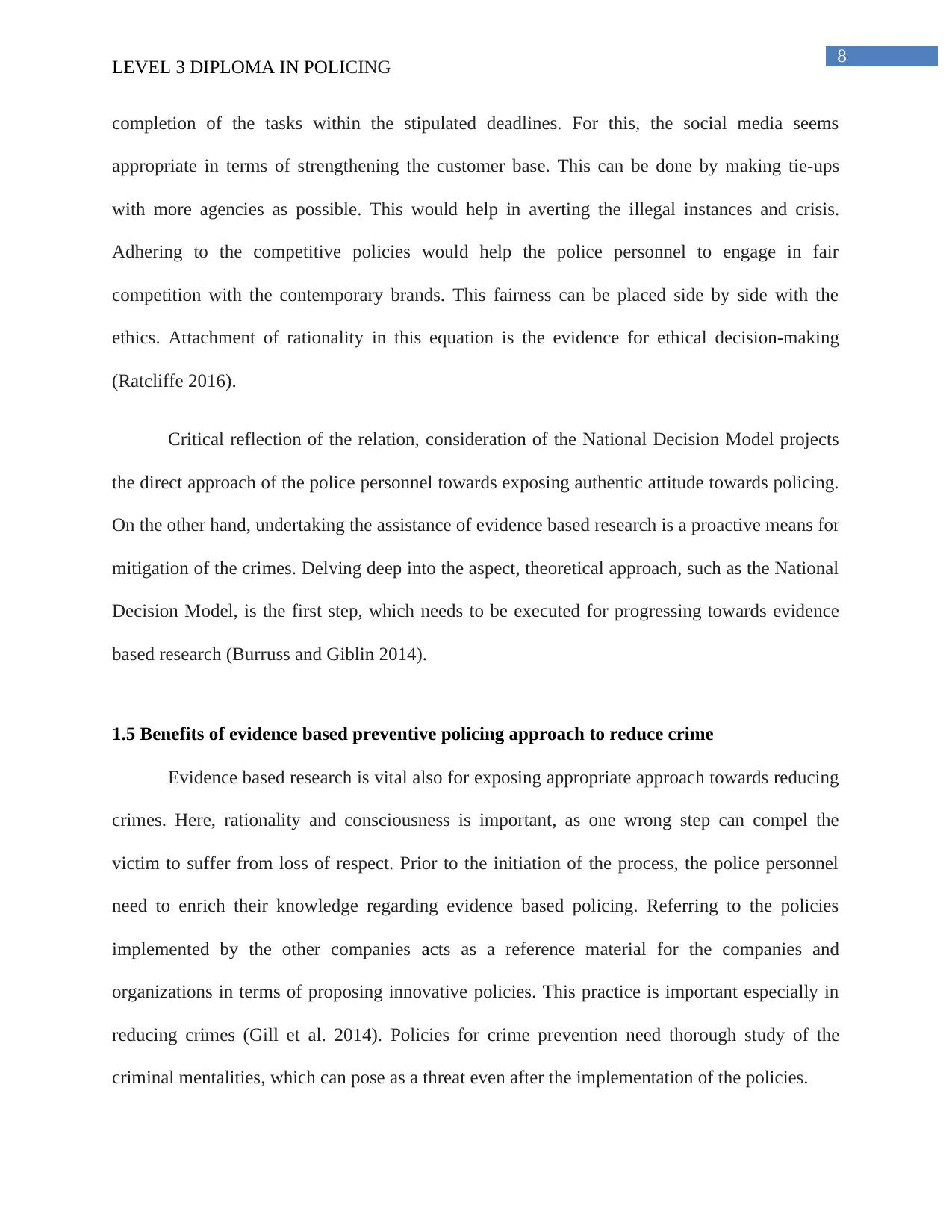
8
LEVEL 3 DIPLOMA IN POLICING
completion of the tasks within the stipulated deadlines. For this, the social media seems
appropriate in terms of strengthening the customer base. This can be done by making tie-ups
with more agencies as possible. This would help in averting the illegal instances and crisis.
Adhering to the competitive policies would help the police personnel to engage in fair
competition with the contemporary brands. This fairness can be placed side by side with the
ethics. Attachment of rationality in this equation is the evidence for ethical decision-making
(Ratcliffe 2016).
Critical reflection of the relation, consideration of the National Decision Model projects
the direct approach of the police personnel towards exposing authentic attitude towards policing.
On the other hand, undertaking the assistance of evidence based research is a proactive means for
mitigation of the crimes. Delving deep into the aspect, theoretical approach, such as the National
Decision Model, is the first step, which needs to be executed for progressing towards evidence
based research (Burruss and Giblin 2014).
1.5 Benefits of evidence based preventive policing approach to reduce crime
Evidence based research is vital also for exposing appropriate approach towards reducing
crimes. Here, rationality and consciousness is important, as one wrong step can compel the
victim to suffer from loss of respect. Prior to the initiation of the process, the police personnel
need to enrich their knowledge regarding evidence based policing. Referring to the policies
implemented by the other companies acts as a reference material for the companies and
organizations in terms of proposing innovative policies. This practice is important especially in
reducing crimes (Gill et al. 2014). Policies for crime prevention need thorough study of the
criminal mentalities, which can pose as a threat even after the implementation of the policies.
LEVEL 3 DIPLOMA IN POLICING
completion of the tasks within the stipulated deadlines. For this, the social media seems
appropriate in terms of strengthening the customer base. This can be done by making tie-ups
with more agencies as possible. This would help in averting the illegal instances and crisis.
Adhering to the competitive policies would help the police personnel to engage in fair
competition with the contemporary brands. This fairness can be placed side by side with the
ethics. Attachment of rationality in this equation is the evidence for ethical decision-making
(Ratcliffe 2016).
Critical reflection of the relation, consideration of the National Decision Model projects
the direct approach of the police personnel towards exposing authentic attitude towards policing.
On the other hand, undertaking the assistance of evidence based research is a proactive means for
mitigation of the crimes. Delving deep into the aspect, theoretical approach, such as the National
Decision Model, is the first step, which needs to be executed for progressing towards evidence
based research (Burruss and Giblin 2014).
1.5 Benefits of evidence based preventive policing approach to reduce crime
Evidence based research is vital also for exposing appropriate approach towards reducing
crimes. Here, rationality and consciousness is important, as one wrong step can compel the
victim to suffer from loss of respect. Prior to the initiation of the process, the police personnel
need to enrich their knowledge regarding evidence based policing. Referring to the policies
implemented by the other companies acts as a reference material for the companies and
organizations in terms of proposing innovative policies. This practice is important especially in
reducing crimes (Gill et al. 2014). Policies for crime prevention need thorough study of the
criminal mentalities, which can pose as a threat even after the implementation of the policies.
⊘ This is a preview!⊘
Do you want full access?
Subscribe today to unlock all pages.

Trusted by 1+ million students worldwide
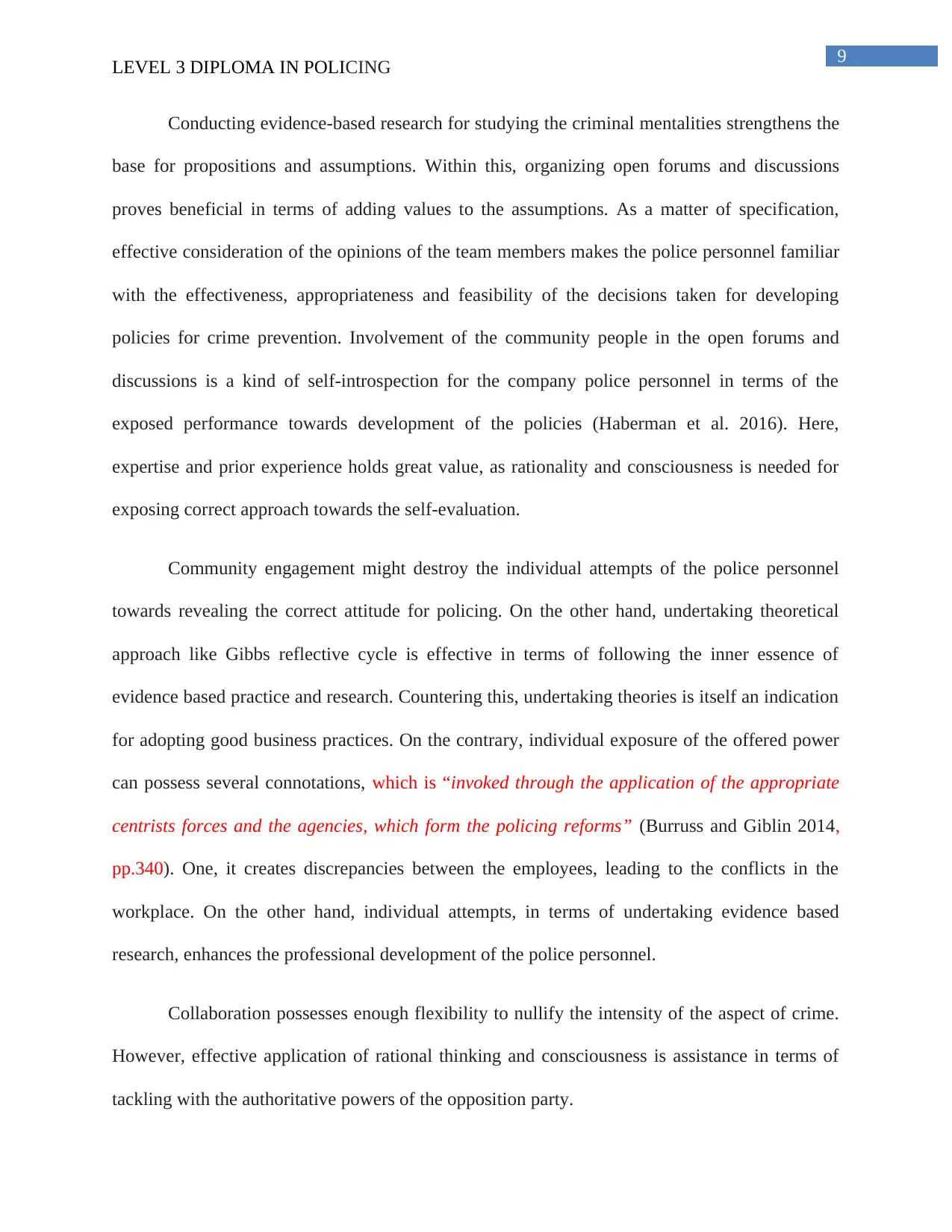
9
LEVEL 3 DIPLOMA IN POLICING
Conducting evidence-based research for studying the criminal mentalities strengthens the
base for propositions and assumptions. Within this, organizing open forums and discussions
proves beneficial in terms of adding values to the assumptions. As a matter of specification,
effective consideration of the opinions of the team members makes the police personnel familiar
with the effectiveness, appropriateness and feasibility of the decisions taken for developing
policies for crime prevention. Involvement of the community people in the open forums and
discussions is a kind of self-introspection for the company police personnel in terms of the
exposed performance towards development of the policies (Haberman et al. 2016). Here,
expertise and prior experience holds great value, as rationality and consciousness is needed for
exposing correct approach towards the self-evaluation.
Community engagement might destroy the individual attempts of the police personnel
towards revealing the correct attitude for policing. On the other hand, undertaking theoretical
approach like Gibbs reflective cycle is effective in terms of following the inner essence of
evidence based practice and research. Countering this, undertaking theories is itself an indication
for adopting good business practices. On the contrary, individual exposure of the offered power
can possess several connotations, which is “invoked through the application of the appropriate
centrists forces and the agencies, which form the policing reforms” (Burruss and Giblin 2014,
pp.340). One, it creates discrepancies between the employees, leading to the conflicts in the
workplace. On the other hand, individual attempts, in terms of undertaking evidence based
research, enhances the professional development of the police personnel.
Collaboration possesses enough flexibility to nullify the intensity of the aspect of crime.
However, effective application of rational thinking and consciousness is assistance in terms of
tackling with the authoritative powers of the opposition party.
LEVEL 3 DIPLOMA IN POLICING
Conducting evidence-based research for studying the criminal mentalities strengthens the
base for propositions and assumptions. Within this, organizing open forums and discussions
proves beneficial in terms of adding values to the assumptions. As a matter of specification,
effective consideration of the opinions of the team members makes the police personnel familiar
with the effectiveness, appropriateness and feasibility of the decisions taken for developing
policies for crime prevention. Involvement of the community people in the open forums and
discussions is a kind of self-introspection for the company police personnel in terms of the
exposed performance towards development of the policies (Haberman et al. 2016). Here,
expertise and prior experience holds great value, as rationality and consciousness is needed for
exposing correct approach towards the self-evaluation.
Community engagement might destroy the individual attempts of the police personnel
towards revealing the correct attitude for policing. On the other hand, undertaking theoretical
approach like Gibbs reflective cycle is effective in terms of following the inner essence of
evidence based practice and research. Countering this, undertaking theories is itself an indication
for adopting good business practices. On the contrary, individual exposure of the offered power
can possess several connotations, which is “invoked through the application of the appropriate
centrists forces and the agencies, which form the policing reforms” (Burruss and Giblin 2014,
pp.340). One, it creates discrepancies between the employees, leading to the conflicts in the
workplace. On the other hand, individual attempts, in terms of undertaking evidence based
research, enhances the professional development of the police personnel.
Collaboration possesses enough flexibility to nullify the intensity of the aspect of crime.
However, effective application of rational thinking and consciousness is assistance in terms of
tackling with the authoritative powers of the opposition party.
Paraphrase This Document
Need a fresh take? Get an instant paraphrase of this document with our AI Paraphraser
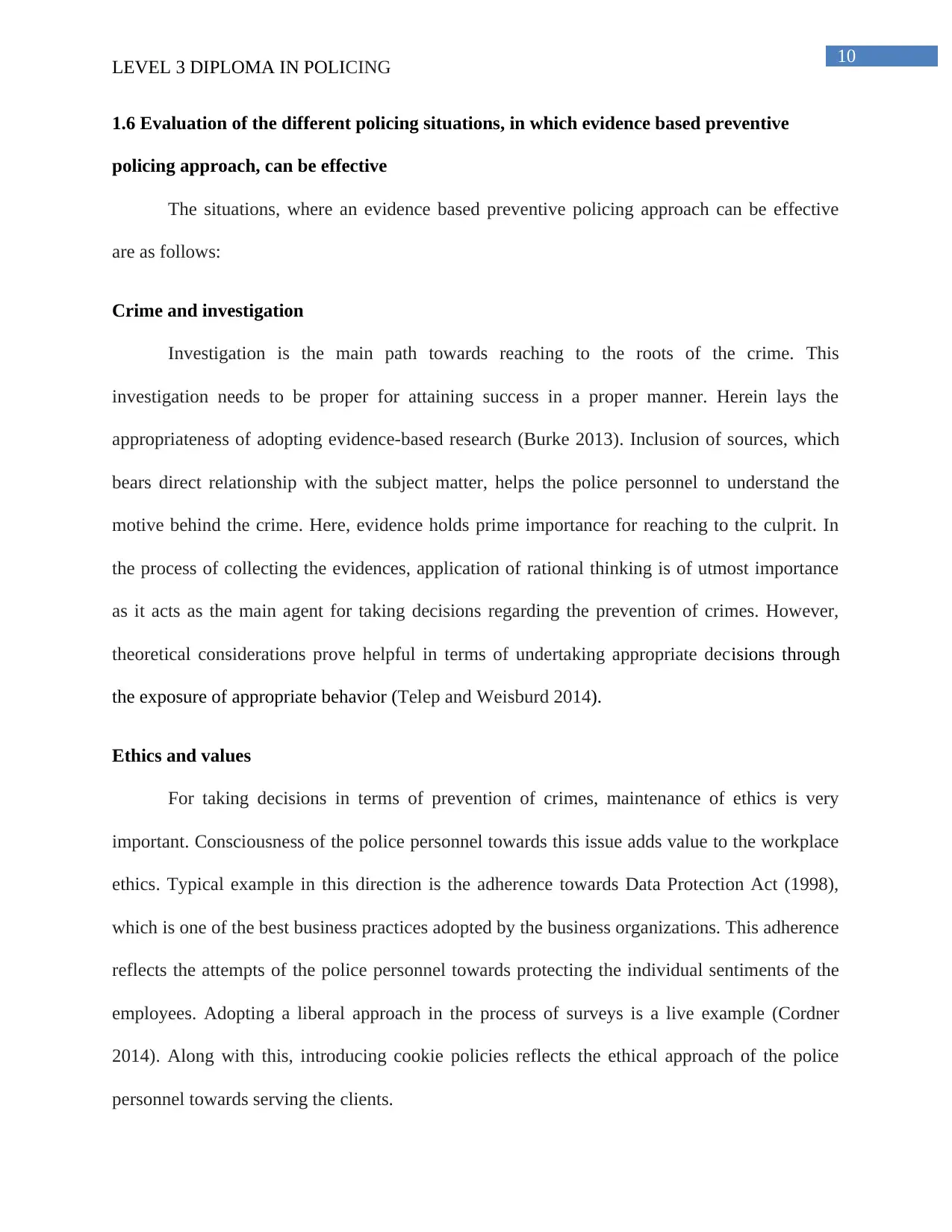
10
LEVEL 3 DIPLOMA IN POLICING
1.6 Evaluation of the different policing situations, in which evidence based preventive
policing approach, can be effective
The situations, where an evidence based preventive policing approach can be effective
are as follows:
Crime and investigation
Investigation is the main path towards reaching to the roots of the crime. This
investigation needs to be proper for attaining success in a proper manner. Herein lays the
appropriateness of adopting evidence-based research (Burke 2013). Inclusion of sources, which
bears direct relationship with the subject matter, helps the police personnel to understand the
motive behind the crime. Here, evidence holds prime importance for reaching to the culprit. In
the process of collecting the evidences, application of rational thinking is of utmost importance
as it acts as the main agent for taking decisions regarding the prevention of crimes. However,
theoretical considerations prove helpful in terms of undertaking appropriate decisions through
the exposure of appropriate behavior (Telep and Weisburd 2014).
Ethics and values
For taking decisions in terms of prevention of crimes, maintenance of ethics is very
important. Consciousness of the police personnel towards this issue adds value to the workplace
ethics. Typical example in this direction is the adherence towards Data Protection Act (1998),
which is one of the best business practices adopted by the business organizations. This adherence
reflects the attempts of the police personnel towards protecting the individual sentiments of the
employees. Adopting a liberal approach in the process of surveys is a live example (Cordner
2014). Along with this, introducing cookie policies reflects the ethical approach of the police
personnel towards serving the clients.
LEVEL 3 DIPLOMA IN POLICING
1.6 Evaluation of the different policing situations, in which evidence based preventive
policing approach, can be effective
The situations, where an evidence based preventive policing approach can be effective
are as follows:
Crime and investigation
Investigation is the main path towards reaching to the roots of the crime. This
investigation needs to be proper for attaining success in a proper manner. Herein lays the
appropriateness of adopting evidence-based research (Burke 2013). Inclusion of sources, which
bears direct relationship with the subject matter, helps the police personnel to understand the
motive behind the crime. Here, evidence holds prime importance for reaching to the culprit. In
the process of collecting the evidences, application of rational thinking is of utmost importance
as it acts as the main agent for taking decisions regarding the prevention of crimes. However,
theoretical considerations prove helpful in terms of undertaking appropriate decisions through
the exposure of appropriate behavior (Telep and Weisburd 2014).
Ethics and values
For taking decisions in terms of prevention of crimes, maintenance of ethics is very
important. Consciousness of the police personnel towards this issue adds value to the workplace
ethics. Typical example in this direction is the adherence towards Data Protection Act (1998),
which is one of the best business practices adopted by the business organizations. This adherence
reflects the attempts of the police personnel towards protecting the individual sentiments of the
employees. Adopting a liberal approach in the process of surveys is a live example (Cordner
2014). Along with this, introducing cookie policies reflects the ethical approach of the police
personnel towards serving the clients.

11
LEVEL 3 DIPLOMA IN POLICING
Community engagement
Evidence based research is also effective in terms of community engagement. This is
because collecting information on the shareholders and stakeholders, who can yield prospective
results in terms of taking beneficial decisions for the betterment of the companies and
organizations. Here also rational thinking is needed in terms of selecting the most appropriate
community agencies, tie-ups with whom would be fruitful in terms of expanding the scope and
arena of the business. Moreover, involvement of communities in the decision-making processes
relates with good practices, which reduces the aspects of conflicts. It also enhances the bondage
between the employees, enhancing the diversity in the workplace (Cordner 2014).
1.7 Importance of collaborative action between stakeholders to achieve evidence based
preventive policing approach
Collaboration is important in terms of achieving best results in the execution of the
allocated projects. This is also application for the exposure of appropriate attitude towards
evidence based policing approach. Theoretical perspective in adopting collaborative approach
adds value to the efforts put in by the police personnel. Herein lays the appropriateness of
Tuckman’s theory of team development. After the formation of the team, the team members need
to be provided with an in-depth insight into the dynamics of evidence based policing (Matthews
and Young 2013). Consciousness and rational thinking in this direction helps the police
personnel to achieve an easy understanding regarding the resources, which needs to be
considered for development of policies for crime prevention.
Collaboration with the stakeholders reflects the attempts of the managers to strengthen
the infrastructure. Training is one of an effective means, which enhances the bondage between
LEVEL 3 DIPLOMA IN POLICING
Community engagement
Evidence based research is also effective in terms of community engagement. This is
because collecting information on the shareholders and stakeholders, who can yield prospective
results in terms of taking beneficial decisions for the betterment of the companies and
organizations. Here also rational thinking is needed in terms of selecting the most appropriate
community agencies, tie-ups with whom would be fruitful in terms of expanding the scope and
arena of the business. Moreover, involvement of communities in the decision-making processes
relates with good practices, which reduces the aspects of conflicts. It also enhances the bondage
between the employees, enhancing the diversity in the workplace (Cordner 2014).
1.7 Importance of collaborative action between stakeholders to achieve evidence based
preventive policing approach
Collaboration is important in terms of achieving best results in the execution of the
allocated projects. This is also application for the exposure of appropriate attitude towards
evidence based policing approach. Theoretical perspective in adopting collaborative approach
adds value to the efforts put in by the police personnel. Herein lays the appropriateness of
Tuckman’s theory of team development. After the formation of the team, the team members need
to be provided with an in-depth insight into the dynamics of evidence based policing (Matthews
and Young 2013). Consciousness and rational thinking in this direction helps the police
personnel to achieve an easy understanding regarding the resources, which needs to be
considered for development of policies for crime prevention.
Collaboration with the stakeholders reflects the attempts of the managers to strengthen
the infrastructure. Training is one of an effective means, which enhances the bondage between
⊘ This is a preview!⊘
Do you want full access?
Subscribe today to unlock all pages.

Trusted by 1+ million students worldwide
1 out of 16
Related Documents
Your All-in-One AI-Powered Toolkit for Academic Success.
+13062052269
info@desklib.com
Available 24*7 on WhatsApp / Email
![[object Object]](/_next/static/media/star-bottom.7253800d.svg)
Unlock your academic potential
Copyright © 2020–2026 A2Z Services. All Rights Reserved. Developed and managed by ZUCOL.




